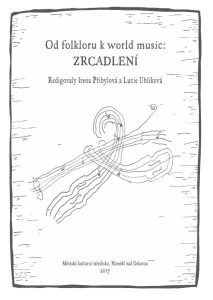Author: Julia Ulehla
Publication details: In From Folklore to World Music: Reflections, edited by Irena Přibylová and Lucie Uhlíková, 119-31. Náměšt nad Oslavou: Municipal Cultural Center, 2017.
Weblink: folkoveprazdniny.cz

Description: According to mythologist Martin Shaw, folk tales are not the “penned agenda of one brainrattled individual” who employs “the most succulent portions of the human imagination” to author them. Rather, he says, they emerge from humans listening to the thinking of the earth itself, and a kind of echo-locating in which the earth “transmits pulses, coded information, lucid image, and then sits back to see what echoes return from its messaging” (2016). Expanding Shaw’s notion—of earth-as-author, humans-as-resounding-translators— to folk song, and narrowing the field to South Moravian folk song as case study, this article explores several ways in which this notion might be true. Nineteenth and early twentieth century Czech/Moravian scholarship emphasized the connection between folk song and its ecological conditions (Sušil, Janáček, Úlehla), and song texts often feature animals, ancestor spirits, and the sentient earth as animate, speaking characters. I employ an experiential, practice-based research to explore these themes, bringing South Moravian traditional songs into cross-cultural heritage sharing encounters with individuals from Indigenous land-based, oral cultures (Cree, Anishinaabe, Syilx, Métis, Haida, Musqueam, others). The result is a meditation on sustainability derived from song, wherein land-based song traditions offer an alternative to the human centric hubris of the anthropocene.